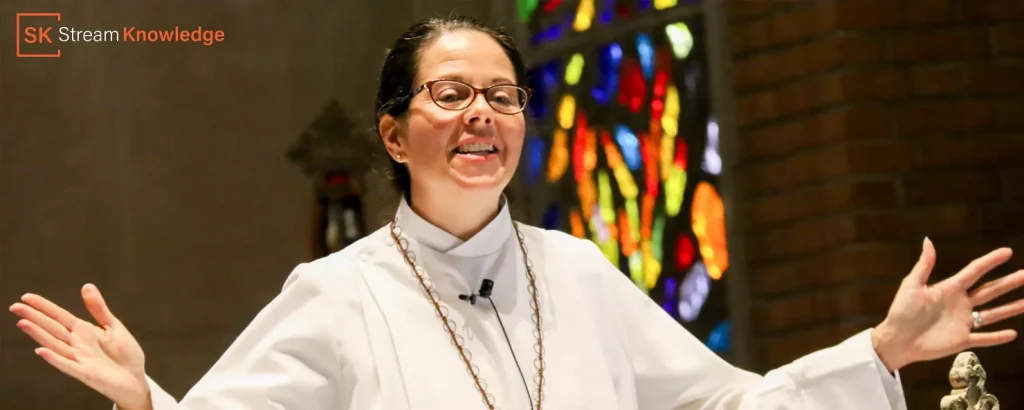Ministry means serving in the function of a priest by offering up spiritual sacrifices acceptable to God. Someone who is called to the ministry senses that God wishes for him or her to devote their life to serving the local church or ministry full-time. God gifts as He deems fit. And the people God gifts travel all manner of routes to do the work God has called them to do.
The Bible addresses important themes several dozen times. Prominent individuals and groups are called ministers throughout Scripture. But the question is gaining prominence nowadays: traditional ministry is fast fading among Christians, and in its place, non-traditional ways of ministry are being practiced. So the question arises: what is ministry, or non-traditional ministry?
What is a Ministry?
Ministry means serving in the function of a priest by offering up spiritual sacrifices acceptable to God. Someone who is called to the ministry senses that God wishes for him or her to devote their life to serving the local church or ministry full-time.
Read More: Is Forgiveness An Act Of God
Decoding Traditional Ministry and its Types
Traditional churches are focused and consistent with their message that God’s commandments, promises, and love are unwavering. They reinforce this with the style and method of delivering these truths being as constant as the house they worship in. They rely on tradition to help remind us that although the world is changing around us, God’s commitment to his children never falters.
Related Resource: How to Explain Being Submissive to your Children
There is a difference between being called to ministry in a general sense and being called to traditional or ordained roles within the ministry. Roles within ordained ministry include becoming a church planter, pastor, or theological educator.
Non-Traditional Ways of Following God’s Call to Ministry
For people within the Reformed Church in America and from other denominations who have been gifted with pastoral ministry, one of those routes is that of the commissioned pastor.
Commissioned Pastor

Elders who have received a commission from their classes to perform a specific pastoral duty in their congregation or community are known as commissioned pastors. Many people have found that the commissioned pastor process allows them to answer God’s call and use the gifts he’s given to them.
Associate Pastor

An associate pastor is one of six commissioned pastors. They teach children at the Lord’s Table, which is the first communion class. They do worship services and sacraments. They have also done many funerals.
Also Read: Reshuffle in Pak Army Portfolios and New Assignments
Bivocational Pastor

A bi-vocational pastor is a good model. The kingdom would grow immensely if people would go into the workplace and meet people and, at the same time, preach the Word. If every elder goes through the commissioned pastor program, more churches could be started, more churches could be planted, and more people could be reached with the gospel.
Director of Mercy and Justice Ministries

As the director of mercy and justice ministries, First Reformed Church wants to make disciples of people who have been in the criminal justice system. They want to bridge the gap between the church and the community. He wants to do the work of leading, teaching, and caring for people in the church.
Farming

Farming is used as a means to create community, combat poverty, and share the gospel. Farming among the educated carries a stigma, but for this alum, the call to connect the good news with the socio-economic challenges that burden so many is exactly what he feels to do. He has already managed to raise funds to purchase a few acres of land and is moving towards the launch of this ministry.
Both the form of ministry and its funding require innovation on the part of this alum. As one who has been reared on a farm and has made several connections between my own agrarian roots and spiritual formation. It gives me pleasure that he has sought wisdom from farmers in the Midwest that deepens his understanding of how to work with the soil and animals.
If farming is an unusual type of non-traditional ministry, spiritual direction is somewhat more common. For decades, ESR has witnessed a significant interest in the practice of spiritual direction as an expression of ministry. It is one of the most direct, intimate methods of assisting individuals in their effort to deepen their relationship with the divine. The practice can be a genuine catalyst for spiritual growth towards health and wholeness.
Examples of Successful Non-Traditional Ministry
Some individuals are combining their ministry with other activities. Some offer spiritual direction and physical fitness yoga as a range of opportunities for interested persons.
On the other hand, some combine spiritual direction, workshops, and writing as a set of ministries. It is interesting to watch their use of social media as a means of cultivating interest, advertising, and remaining connected with those to whom she ministers. In each case, the work is demanding, compounded by the background work necessary to create the actual ministry opportunities.
Sometimes, non-traditional ministry is not a stand-alone operation. It has been discovered that there are many open doors for ministry in the law profession. The seminaries have transformed the way in which lawyers approach their legal work, so much so that this is now a method of ministry.
Some alums are gripped by the injustices of the U.S. penal system while students are at ESR. This helped in framing a ministry in which a program to work with inmates before their release was developed. The goal is to address the high rate of recidivism, particularly among African American males. The alumni established a non-profit, secured enough funding to launch the ministry, and established a successful track record.
Non-Traditional Challenges: What to Expect
Navigating the path of non-traditional ministry is full of challenges and hurdles. These challenges test the resolve and dedication of those who call to these roles. Undoubtedly, this journey of non-traditional ministry demands resilience and dedication. However, despite these challenges, many find fulfillment in serving their communities in unconventional yet impactful ways
Balancing Multiple Responsibilities
Outside their ministry roles, non-traditional ministers often have other jobs or commitments. Therefore, it becomes challenging to balance these responsibilities. It requires effective time-management skills.
Financial Constraints
Non-traditional ministers often do not receive full-time salaries for the job of ministry they do. It ultimately leads to financial constraints that can cause stress and uncertainty, especially when they have to support a family or cover ministry-related expenses.
Societal Stereotypes
People usually view non-traditional ministers as less capable than full-time pastors. It becomes challenging to overcome such perceptions, which can impact their confidence and sense of belonging.
The feeling of Compatibility in the Religious Community
Non-traditional ministers often find it hard to feel accepted and valued within their religious community. It becomes exacting to find a sense of belonging and build relationships, but it is key to effective ministry.
Future Trends in Non-Traditional Ministry
As non-traditional ministry is evolving day by day, various innovative trends are shaping the landscape of religious leadership. Reflecting a strong emphasis on digital outreach, innovative engagement methods, and a focus on mental health and wellness, non-traditional ministries are making significant strides.
Digital Ministry Expansion
Due to reliable digital platforms, non-traditional ministries are expanding through digital channels. Live streams and online consulting sessions help them connect with a global audience.
Outreach Methods
Non-traditional ministries are seeking to explore advanced methods to engage their audience. They use social media influencers and engaging online content to reach their audience.
Collaborative Ministry Models
With the help of cross-denominational initiatives, shared resources, and joint outreach, non-traditional ministries are adopting collaborative methods to amplify their impact.
Technology Integration
With ministries seeking new tools and ways to engage their audience, technology will keep playing a significant role in non-traditional ministry. Using AI for customized guidance, and mobile apps for discipleship, they are enhancing their outreach.
Conclusion
To sum up, the ministry is a broad and inclusive term. It suggests that where traditional types of ministries fail to evolve a more comprehensive system, there is a need for non-traditional ministries as well. However, there is a dire need to provide non-traditional ministries with enough resources and job security.

